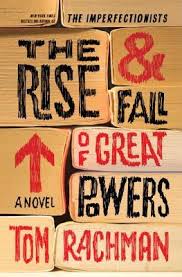 Published by Sceptre UK, Dial Press US
Published by Sceptre UK, Dial Press US
384pp, hardback, price £14.99/ $27.00
Reviewed by Elsbeth Lindner
The seismic geo-political shifts hinted at in the title of Tom Rachman’s second novel do shape the destiny of Matilda (Tooly) Zylberberg, the waif at the centre of the story, but only in so far as they mould the characters and actions of the three father figures in her life.
Tooly’s birth father Paul, a computer nerd with limited social skills but, when pushed, a crucial sense of moral obligation, works installing new centralized technology in US embassies around the world in the late 1980s. Venn, the mercurial Canadian charmer whom Tooly looks on as her best friend, benefactor and protector, takes advantage of the tectonic movements of history as his grand exploitative opportunity: ‘History is the issue… People, it turns out, aren’t a product of their own time. They’re a product of the time before theirs.’ And Humphrey, Tooly’s substitute father figure, a sentimentalized lost soul with a wounded heart, a comic accent and an insatiable craving for great books and intellectuals, is a victim of the terror that swept through mid-twentieth century Europe. On the other hand, those great powers may just be the episodic control these men have over a woman who grows into her own freedom.
As much as anything, this novel is a shaggy dog story-esque search for self across three different eras: 1988 (when Tooly is ten), 1999 and 2011. While the reader tries to piece Tooly’s life together from the back and forth chapters, Tooly herself, giving little away, makes her own journey of discovery. Rachman jumps back and forwards in time and place – Wales, Italy, New York, Bangkok – as much perhaps to complicate as to entertain.
Paul, Venn and Humphrey all take their bizarre turns sheltering Tooly in strange, sometimes decrepit accommodation, displaying different forms of dubious parenting. They also all tell lies and all eventually deliver revelations that force Tooly to recalibrate herself and her emotional investments. That’s the essence of this quirky triple-decker novel stuffed with literary reference, peculiar relationships, pronouncements and place names.
Rachman spins a fine narrative silk, humorous enough to engage and amuse while simultaneously suggesting the fragility of isolated, rootless Tooly. Peril and instability are implied, just below the buoyant surface, while Tooly, preternaturally bright, confident and free-thinking at ten as well as beyond, seems unfazed by the dangers that swirl around her in every decade. Her upbringing is rackety, her mother a destructive force, her companions conmen. Even a do-gooding ex-boyfriend confesses his hatred for another trusting innocent – namely his own son. Is anyone solid? And yet, surprisingly, Tooly emerges into adulthood if not exactly undamaged, then in relatively decent shape.
This is a hard novel to categorize. A woman’s search for self? That’s usually the interior landscape of female writers. But Rachman’s novel is not a tale of questioning introspection. Instead, it’s an entertaining iridescent bubble of storytelling, born brightly aloft on confident gusts of humor, indulgence, geographical movement and mystery. When it bursts, however, there’s not a great deal left behind.
